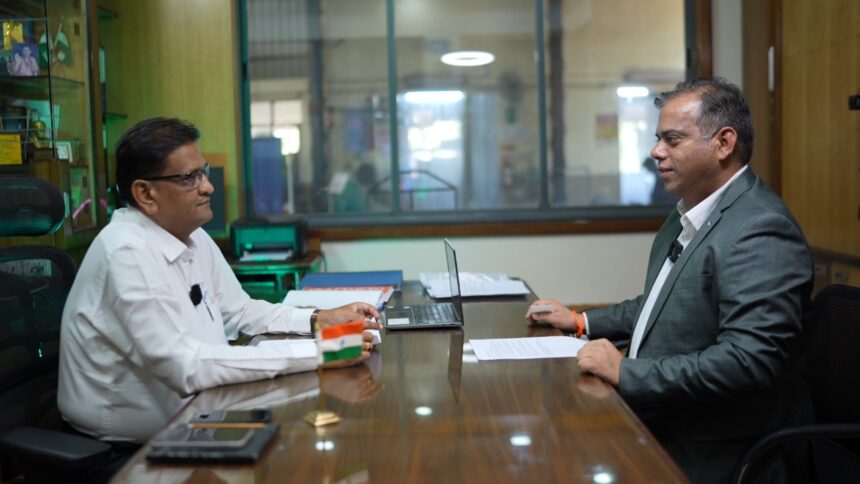The team from Dynamic Manufacturing India magazine had the opportunity to have a fruitful discussion with Shridhar Uppin, CEO, Positron Engineering Corporation.
Positron Engineering Corporation’s designs are considered special and unique for each client. Can you tell us more about the company’s approach to customizing designs to meet the unique engineering requirements of various site locations and applications?
Positron Engineering Corporation specializes in customizing designs to fit the unique engineering needs of various site locations and applications. Our approach involves thoroughly analyzing each client’s requirements and incorporating site-specific factors and application nuances into the design process. By prioritizing flexibility and adaptability, we ensure our solutions precisely fit the unique parameters of each project to deliver optimal performance and efficiency.
Can you talk about the challenges and strategies of aligning design specifications to multiple standards across various projects?
Aligning design specifications to multiple standards for heat exchanger manufacturing is challenging due to diverse requirements and complex designs. Strategies include thorough standards review, compliance prioritization, leveraging expertise, standardization, supplier collaboration, simulation/testing, documentation, and continuous improvement. These approaches streamline compliance efforts and ensure efficient, high-quality heat exchanger manufacturing across a range of projects.
Can you tell us more about the facilities and resources available at your Belgaum facility for world-class manufacturing, including machine shop, assembly, testing and painting facilities?
Our Belgaum facility has in-house facilities to manufacture heat exchangers right from design to export quality packaging. Our designs involve thermal and mechanical design and use simulation tools to validate the designs. We have conventional equipment as well as state-of-the-art machinery to ensure high quality output with minimal defects. Our experienced and qualified employees including 6G certified welders, NACE certified painters ensure the desired quality output. Our well-trained and qualified quality inspectors monitor all stages of the manufacturing process. We are accredited with ASME U, U2 R, NB stamp certificates. Our testing facility is capable of testing heat exchangers up to 500 Bar hydrostatic test pressure.
What measures are in place to ensure the qualifications and training of team members, especially with regard to welding and material-specific skills?
1. Structured training program:
2. Positron will establish a formal training program covering important topics related to welding techniques, safety protocols and material handling.
3. These programs are often aligned with industry standards and guidelines such as ISO 9001, ISO 14001, ISO 45001, and ASME.
Certifications and qualifications:
4. Welders undergo a certification process to qualify their skills. These certifications are usually based on the specific welding process (shielded metal arc welding, gas metal arc welding, tungsten inert gas welding, etc.).
5. Qualification testing evaluates a welder’s ability to meet specific standards, such as weld quality, joint preparation, and material compatibility.
Training Modules:
6. Modular, competency-based training programs allow trainees to progress incrementally (e.g., Welding Inspector, Non-Destructive Testing, etc.).
7. These modules cover various aspects such as safety, equipment handling and material specific techniques.
Material Handling:
8. We have expertise in handling materials like various grades of Carbon Steel, Copper and its alloys (Admiralty Brass, Naval Brass, Cupronickel etc.), various grades of Stainless Steel (AISI 304, 316, 316 L, Duplex Stainless Steel and Super Duplex Stainless Steel), Aluminium, Titanium etc.
Positron Engineering Co., Ltd. strives to achieve customer satisfaction and maintain high product quality. How does the company incorporate customer perspectives and needs into its quality assurance process?
We utilize multiple tools to understand our customers’ requirements and deliver results that exceed their expectations.
• Customer Feedback – Positron proactively collects customer feedback through surveys, reviews and direct communication.
• Requirement Analysis: Requirements form the basis for designing, developing and testing the product.
• Design Validation: The prototype is tested with potential users to validate functionality, usability, and overall satisfaction.
• Continuous Improvement: Periodic reviews improve manufacturing, assembly and quality control.
• Post-sales support: Demonstrate your commitment to customer satisfaction by quickly responding to issues.
What quality control measures does Positron Engineering Co., Ltd. implement to ensure the reliability and durability of its products?
Our 25 years of experience in heat exchanger manufacturing has been poured into establishing manufacturing processes that deliver the desired quality output.
• Fully qualified and trained Quality Engineer
• Latest technology quality measurement equipment like PMI machine, boroscope, ultrasonic testing, oil flushing for internal cleaning of heat exchangers.
• Quality control right from raw material suppliers to final packaging ensures desired quality output.
Finally, let’s talk about Belagavi: what does the city offer in terms of food, culture and business opportunities? How can it contribute to the growth of manufacturing in Karnataka and India as a whole?
Belagavi is positioned as a dynamic city with a blend of culture, education and industry, with immense potential for growth and development.
food:
• Diverse culinary scene: Belgaum boasts of a diverse culinary scene that blends the flavours of Karnataka, Maharashtra and Goa. From spicy curries to delicious sweets, you’ll find everything.
• Kunda: A must-try speciality sweet made from milk, sugar and spices, kunda is a local favourite with its melt-in-your-mouth texture and rich flavour.
• Jolada Roti and Enne Badnekai: Enjoy the classic combination of traditional jowar (sorghum) flatbread (jolada roti) and spicy eggplant (enne badnekai) curry.
• Biryani and Kebabs: Belgaum’s biryani and juicy kebabs are a delight for any foodie. The aromatic rice and tender meat are sure to tantalise your taste buds.
culture:
• Historical Heritage: Belgaum has a history influenced by the Chalukyas, Rashtrakutas and Bahmanis. Explore the Belgaum Fort, ancient temples and colonial architecture.
• Linguistic diversity: Several languages are spoken in the city, including Kannada, Marathi, Konkani, etc. This blend of languages enriches the cultural fabric and promotes harmony.
• Music and Festivals: Belgaum hosts vibrant music festivals, including classical concerts and folk performances. The Ganesh Chaturthi festivities are a festive affair.
• Crafts: Exploration Local Market Exquisite bidriware (metalwork), handwoven sarees and wooden toys are testament to Belgaum’s craftsmanship here.
Professional Ecosystem:
• Strategic Location: Belgaum’s proximity to major cities like Bangalore, Mumbai and Pune makes it a strategic hub for trade and commerce.
• Manufacturing hub: The city contributes significantly to Karnataka’s manufacturing sector. In FY17, manufacturing contributed 14.76% of Belgaum’s GSDP, higher than the national average.
• Industrial Corridors: Belgaum is located along the Chennai-Bangalore Industrial Corridor (CBIC) and the Bangalore-Mumbai Economic Corridor (BMEC). These corridors enhance connectivity and attract investments.
• Skilled Workforce: With a skilled workforce and vibrant industrial environment, Belgaum plays a pivotal role in the economic growth of Karnataka.
Contribution to the growth of manufacturing in Karnataka and the country:
• Manufacturing excellence: Belgaum accounts for 32% of Karnataka’s manufacturing investments and aims to take manufacturing’s GDP share to 25% in the next decade.
• Robust Infrastructure: The city’s extensive road network, major highways and the New Mangalore Port ensure seamless connectivity for trade and exports.
• Technology and Biotechnology: While the IT sector contributes to over 24% of the state’s GDP, Belgaum’s manufacturing sector plays a vital role in overall economic growth.







